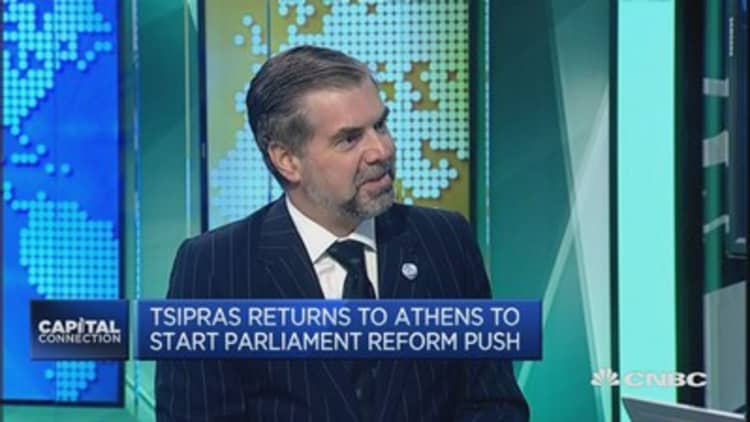Greece has made payments on 11.7 billion yen ($94.6 million) of samurai bonds maturing on Tuesday, in what was a closely watched transaction following yesterday's long-awaited deal between the indebted country and its international creditors.
A spokeswoman at bond administrator Mizuho Bank confirmed the payment. Samurai bonds are yen-denominated bonds issued in Japan by non-Japanese companies, giving the borrowers access to Japanese capital. Greece sold samurai bonds to investors in 1995 worth 11.7 billion yen, with further sales in in 1996 worth about 46.4 billion yen.
After Greece missed payment on a 1.6 billion euro debt to the International Monetary Fund in late June, and reportedly missed a further 450 million euro payment due to the IMF on Monday, there was concern the country could also miss payment on the bonds.

Nizam Idris, head of strategy, fixed income and currencies at Macquarie Bank, said that Greece likely prioritized the samurai payment because to miss it would have been its first default on a private sector debt.
"A large proportion of samurai bonds are held by private investors so not paying this would be a bigger deal than not paying the IMF," he said. "Ratings agencies don't define missed payments to the IMF as a credit event, but if they missed this one it could be considered a default."
While not a large amount, the payment indicates that Greece does have some liquidity around, he said. To put the sum in context, the samurai payment was less than the cost of the recent referendum, said Idris. The poll that rejected an earlier debt deal was estimated to cost about 110 million euros, according to AFP.

Read MoreGreece's $55B privatization fund: How it will work
After 17 hours of talks that spilled into the early hours of Monday, euro zone leaders agreed a reform-for-cash deal that Greece hopes will pave the way to a third bailout.
Under the terms of the deal, Athens must push free-market economic reforms austerity measures through its parliament. In return, European authorities will provide about 86 billion euros over the next three years to help cover Greece's debts and aid its economy.
Greek Prime Minister Alexis Tsipras now faces the difficult task of getting reform legislation through parliament by Wednesday, in the face of opposition within his own coalition.
- Ansuya Harjani contributed to this report
- Reuters contributed to this report

